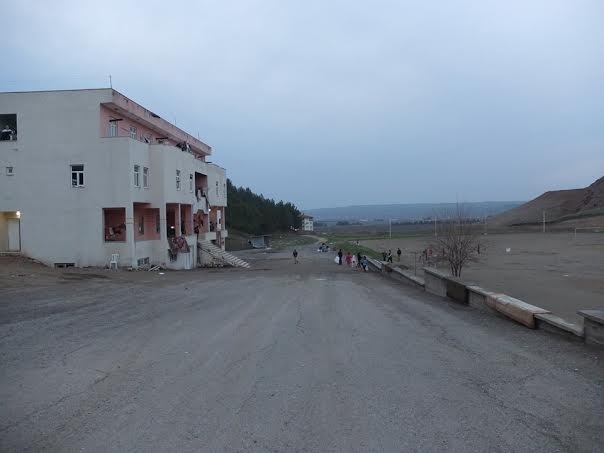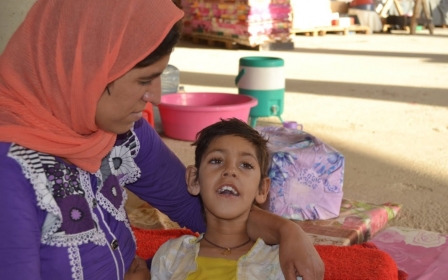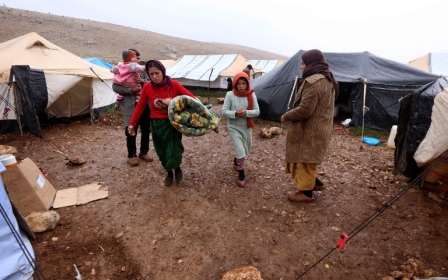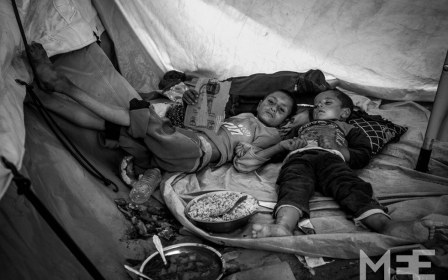Left behind: Americans abandon Iraqis who helped them

BATMAN, Turkey - Sivan is a 43-year-old man with short black hair, wrinkled hands and dark shadows under his eyes. When the Islamic State (IS) entered north Iraq in August 2014, he swiftly picked up a handful of belongings and fled from his home with his family. And though they escaped the sounds of gunfire, his children remain traumatised from the dying screams of their people.
“My son always thinks about the killing,” Sivan told Middle East Eye as he rubbed his hands for warmth outside a crowded refugee camp in eastern Turkey.
Following Iraq’s first constitutional elections under American occupation in 2005, Sivan was hired as an interpreter by the American armed forces.
The occupation deepened the distrust of an already divided country, and since decades of state repression denied the making of any civil society to promote reconciliation, violence erupted to new heights between the country’s multiple communities.
With much of the Sunni population marginalised from the new power structure, an insurgency called al-Qaeda in Iraq (AQI) - the predecessor to IS - expanded by attracting destitute members of their community. The group vowed to eliminate US forces, those assisting them and anyone they considered apostates to Islam.
“They had two reasons to kill us,” Sivan told MEE. “We are Yazidi, and I used to be an American interpreter.”
After escaping to Batman - a predominantly Kurdish-populated city in southeast Turkey - Sivan applied for a special immigration visa (SIV) to the United States. The SIV programme was established in 2008 to offer Iraqi interpreters a legal channel to immigrate to America.
But while Sivan managed to submit his SIV application in exile, he remains one of nearly 43,000 Iraqis waiting precariously to receive a decision from the US State Department.
Stuck in the bureaucratic pipeline
The SIV programme was terminated in September 2014 in favour of the more inclusive Direct Access programme (P2). While the latter was designed for any Iraqi experiencing imminent danger due to a past affiliation with the US, the expansion of IS in June prompted the US Embassy in Baghdad to suspend refugee processing.
The absence of this service has pushed thousands of Iraqis to flee to neighbouring countries and file an asylum claim to the US through the International Organisation of Migration (IOM). But though processing continues outside the country, the suspension has spiked growth in the backlog at a rate of 2,000 additional applicants each month.
“People often get stuck in administrative processing for years, until they are rejected for unexplained reasons,” said Catherine L. Crook over Skype. Cook is a communication’s associate for the Iraqi Refugee Assistance Project (IRAP), an organisation that provides legal assistance to those most endangered in the Middle East.
Bashar, a former officer in the post-Saddam police force, said he hid his badge from many of his neighbours who were affiliated with AQI. Living in fear for his life since 2004, he waited until he made enough money to resign and protect his family.
When Bashar escaped to Batman from IS in August, he contacted IOM to jump-start his asylum application. Despite being somewhat competent in spoken English, illiteracy has prohibited him from following the online instructions.
“I don’t know what the Americans want,” said Bashar, as he handed MEE his asylum registration from IOM. “I’m afraid my family will stay in this camp forever.”
“Most of our interpreters couldn’t read very well,” said Robert over Skype. Robert is a former battalion commander who had employed Sivan during his tenure in Iraq.
Robert’s battalion depended on nine interpreters while training the Iraqi army and police force in 2008. Indebted to these translators for preserving his safety, he’s tried to help Sivan by explaining the instructions to the SIV online application over the phone.
Yet without any internet, and frequent power cuts in the building housing Sivan, submitting all the proper documents has been a trial for Sivan. And though there is reason to hope for those who eventually complete the application, only 3,084 SIVs were approved in 2014 despite the prevailing backlog. This number totals the highest distribution since the programme was formed.
Security Denials
Despite strong recommendations from IRAP, Crook says that thousands of cases are denied for “security reasons”. However, the exact grounds for rejection are almost never revealed.
Past sufferings from unlawful detainment, torture and eventual prosecution under Saddam Hussein’s regime have been considered reasonable grounds to refuse an applicant. For others, an affiliation with groups that allied with US troops during the occupation lead to a rejection.
“There are usually no explanations and no opportunity to appeal the outcome,” Crook told MEE.
Once denied, many turn to the United Nations High Commissioner for Refugees (UNHCR), where asylum seekers in Turkey wait for nearly 10 years before they're informed if they qualify for resettlement.
Feysel, a 32-year-old Yazidi farmer, fled to the Iraqi village of Dahook where his wife had a lifesaving kidney transplant. She hardly had any time to recover before escaping from IS with her family.
When they arrived to Batman, Feysel registered the family with UNHCR in hopes of being relocated to a safe third country. But their first asylum interview, required to determine their refugee status, isn’t scheduled until 20 May 2022.
“My wife’s health isn’t good,” Feysel told MEE, as he held his child in his arms. “She could never wait in these conditions for that long.”
After showing UNHCR his wife’s medical notes from Dahook, documenting her urgent need for clinical care, they conceded and rescheduled his family’s interview for 20 May, 2015. Because asylum seekers in Turkey almost never have their cases pushed forward this early, SIVs are considered the only strand of hope for US-affiliated Iraqis.
As of today, over 300 Yazidis live in an old school building that’s being tended for by the People’s Democratic Party (BDP), a pro-Kurdish party in Turkey. With little control over their fate, many wait aimlessly for any word from the US State Department.
“I wish my son could sleep,” said Sivan, while starring beyond the horizon from the building’s entrance. “I’ll never take him to Iraq again.”
New MEE newsletter: Jerusalem Dispatch
Sign up to get the latest insights and analysis on Israel-Palestine, alongside Turkey Unpacked and other MEE newsletters
Middle East Eye delivers independent and unrivalled coverage and analysis of the Middle East, North Africa and beyond. To learn more about republishing this content and the associated fees, please fill out this form. More about MEE can be found here.




